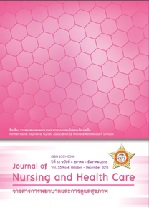ผลของโปรแกรมการให้ข้อมูลสิ่งเร้าด้านโภชนาการต่อการปรับตัวด้าน โภชนาการและระดับอัลบูมินในเลือด ของผู้ป่วยไตเรื้อรังระยะสุดท้าย ที่ได้รับการรักษาด้วยการล้างไตทางช่องท้องชนิดถาวร Effects of Nutritional Stimuli Information Program to Nutritional Adaptation a
คำสำคัญ:
การปรับตัวด้านโภชนาการ การล้างไตทางช่องท้องชนิดถาวร โปรแกรมการให้ข้อมูลสิ่งเร้าด้าน โภชนาการ nutritional adaptation, continuous ambulatory peritoneal dialysis, nutritional stimuli Information programบทคัดย่อ
การวิจัยครั้งนี้เป็นการวิจัยเชิงทดลองเพื่อศึกษาผลของโปรแกรมการให้ข้อมูลสิ่งเร้าด้านโภชนาการต่อการ
ปรับตัวด้านโภชนาการและระดับอัลบูมินในเลือดของผู้ป่วยไตเรื้อรังระยะสุดท้ายที่ได้รับการรักษาด้วยการล้างไต
ทางช่องท้องชนิดถาวรที่มีระดับอัลบูมินในเลือดตํ่ากว่า 3.5 กรัมต่อเดซิลิตรที่เข้ารับบริการที่หน่วยล้างไตทาง
ช่องท้อง โรงพยาบาลประจำจังหวัดแห่งหนึ่ง จำนวน 30 ราย ทำการสุ่มเข้ากลุ่มทดลองและกลุ่มควบคุม กลุ่มละ
15 ราย กลุม่ ทดลองเปน็ กลุม่ ที่ไดรั้บโปรแกรมการใหข้ อ้ มูลสิ่งเรา้ ดา้ นโภชนาการเปน็ เวลา 8 สัปดาห ์ สว่ นกลุม่ ควบคุม เป็นกลุ่มที่ได้รับการพยาบาลตามปกติ สำหรับโปรแกรมฯ ถูกสร้างขึ้นโดยผู้วิจัยตามทฤษฎีการปรับตัวของรอยประกอบด้วยการให้ข้อมูลสิ่งเร้าเกี่ยวกับโรค การรักษาและหลักการบริโภคอาหารเฉพาะโรคแบบรายบุคคลที่เน้น
การมีส่วนร่วมของครอบครัวโดยใช้สื่อวีซีดี คู่มืออาหาร ภาพพลิกเมนูอาหารไข่ขาวและโทรศัพท์กระตุ้นเตือน
เก็บรวบรวมข้อมูลก่อนและหลังได้รับโปรแกรมฯโดยใช้แบบประเมินการปรับตัวด้านโภชนาการและวัดระดับอัลบูมิน
ในเลือด วิเคราะห์ข้อมูลโดยใช้สถิติ บรรยาย Paired t-test และ Independent t-test ผลการวิจัยพบว่า ภายหลัง
ได้รับโปรแกรมฯ กลุ่มทดลองมีค่าเฉลี่ยคะแนนการปรับตัวด้านโภชนาการสูงกว่าก่อนได้รับโปรแกรมฯ และสูงกว่า
กลุ่มควบคุมอย่างมีนัยสำคัญทางสถิติ (p < .05) สำหรับค่าเฉลี่ยระดับอัลบูมินในเลือดยังไม่พบความแตกต่างกัน
ทางสถิติระหว่างกลุ่มทดลองและกลุ่มควบคุมผลการวิจัยแสดงให้เห็นว่าสามารถนำโปรแกรมฯ นี้ไปใช้ในการวางแผนการพยาบาลเพื่อส่งเสริมการปรับตัวด้านโภชนาการของผู้ป่วยไตเรื้อรังระยะสุดท้ายที่ได้รับการรักษาด้วยการล้างไตทางช่องท้องชนิดถาวรได้อย่างมีประสิทธิภาพ
This experimental research aimed to examine the effects of a Nutritional Stimuli Information Program to nutritional adaptation and serum albumin level among the end-stage chronic kidney disease patients receiving Continuous Ambulatory Peritoneal Dialysis (CAPD). The 30 subjects who attended into the CAPD clinic of a Province Hospital from May 2014 to August 2014, were randomly assigned into the experimental group and the control group, 15 cases per group. The experimental group received the Nutritional Stimuli Information Program, whereas the control group received a usual care. This program was
developed by the researcher based on Roy’s Adaptation Model included video - CD, andbooks, flipchart and telephone reminders. It was focus on family support. Data were collected using the Nutritional Adaptation scale and measurement of serum albumin level at baseline, and 8 weeks after entering the program, and were analyzed using descriptive, Paired t-test, and Independent t-test. The results concluded that after receiving the program, the experimental group had a Significantly greater overall nutritional adaptation mean score than before receiving the program (p< .05) and the experimental group had a significantly greater overall nutritional adaptation mean score than the control group (p< 05). After receiving the program, there were not statistically significant difference between the experimental group and the control group in serum albumin level.



